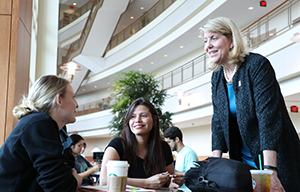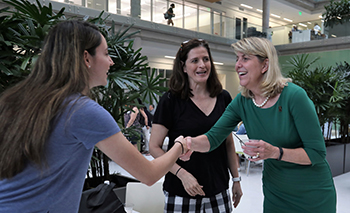Livingstone feels God called her to Baylor presidency
WACO—Linda Livingstone accepted the post as Baylor University’s president when the school faced multiple investigations regarding its handling of sexual abuse complaints for one simple reason: She felt God called her to the position.
‘Help make a difference’
“I viewed it as an opportunity to go back to a place that I love and really try to help make a difference,” said Livingstone, who taught at Baylor 11 years in the Hankamer School of Business.
 Linda Livingstone“I knew that they were deeply committed to learning from what had happened, to making changes and moving forward. I knew a lot of the people here. I knew where their hearts were and that it would just be a tremendous opportunity to work with people to move the university forward to a really good place.”
Linda Livingstone“I knew that they were deeply committed to learning from what had happened, to making changes and moving forward. I knew a lot of the people here. I knew where their hearts were and that it would just be a tremendous opportunity to work with people to move the university forward to a really good place.”
Baylor’s board of regents hired the Pepper Hamilton law firm to investigate the university’s handling of sexual assault reports. After a briefing by Pepper Hamilton, the board announced the investigation revealed a “fundamental failure” by Baylor to implement Title IX of the Education Amendments of 1972 and the Violence Against Women Reauthorization Act of 2013.
The board removed Ken Starr as president, fired Head Football Coach Art Briles and sanctioned Athletic Director Ian McCaw. Starr later stepped down as chancellor and law professor, and McCaw resigned as athletic director.
Livingstone accepted the Baylor presidency at a time when the school remains under a one-year warning from the Southern Association of Colleges and Schools Commission on Colleges.
Baylor also is under investigation by the U.S. Department of Education’s Office of Civil Rights and by the Big 12 Conference. Several women also have named the school in lawsuits, asserting Baylor failed to protect their safety or deal properly with their sexual assault claims.
‘Absolutely felt called to be here’
Moving from George Washington University in Washington, D.C., where she was dean of the business school, to Baylor in Waco represented a big decision for Livingstone and her family, and she said they sought God’s guidance.
“There was a lot of prayer and reflection that went into the decision to come back to Baylor,” she said. “I absolutely felt called to be here at this point in time.”
She believes her experiences as dean of the business school at Pepperdine University in California and at George Washington University uniquely prepared her for the Baylor presidency.
“God was preparing me through those experiences, through the opportunities and challenges I had at those two institutions, to be ready to come back to Baylor at this particular point in time,” she said. “So I personally, and my family more generally, really feel God called us back to Baylor.”
Sense of mission
Baylor’s mission—to integrate academic excellence and Christian commitment within a caring community—meshed perfectly with her personal sense of mission, Livingstone noted.
 Baylor University President Linda Livingstone gets acquainted with students. (Photo/Baylor Marketing and Communications)“An institution is the people who make up the institution,” she said, pointing to the way faculty, administrators and board of regents at Baylor remain committed to maintaining the integrity of the school’s Christian mission.
Baylor University President Linda Livingstone gets acquainted with students. (Photo/Baylor Marketing and Communications)“An institution is the people who make up the institution,” she said, pointing to the way faculty, administrators and board of regents at Baylor remain committed to maintaining the integrity of the school’s Christian mission.
Because her academic training focuses on organizational behavior, Livingstone sees a key aspect of her role as assembling a quality leadership team who share the sense of mission—including the development of Baylor as a caring community.
“Each individual on our campus is a valuable human being in God’s eyes, uniquely gifted in God’s eyes,” she said. “So, we need to respect that and value that—even in the context of disagreeing about things or having hard discussions, being thoughtful about how we treat each other and how we have those conversations. …
“On a college campus, having a caring community is also about how we look out for the health, safety and well-being of particularly our students, but also the community as a whole. Frankly, we weren’t doing that as well as we should have.
“We are continuing to learn about what we weren’t doing well, what we need to do better and how we ensure the environment we are providing our students is one that lets them know they are valued, they are loved and they are gifted by God, and there are ways we can help support them when they are having difficult times.”
Livingstone also emphasized the importance of the university’s role in students’ Christian character development and spiritual growth.
Spiritual journey
Discussion of the university’s Christian mission comes easy to Livingstone, who grew up Methodist, has been an involved member of Baptist churches in Oklahoma, Waco and Washington, D.C., and who led the business school at a Church of Christ-affiliated university in California.
As a fifth grader, she made a commitment to Christ during a Lay Witness Mission event at a Methodist church in Perkins, Okla.
In college at Oklahoma State University, she attended University Heights Baptist Church in Stillwater, Okla., with some of her teammates on the women’s basketball team and became deeply involved in the Fellowship of Christian Athletes. She also worked two summers at Christian camps in southwest Missouri.
She met her future husband, Brad, at University Heights Baptist Church during her undergraduate years, and when she returned to OSU to pursue her doctorate, the two of them taught a young married couple’s Sunday school class at the church.
While Livingstone was on faculty at the Hankamer School of Business at Baylor, she and her family worshipped at Calvary Baptist Church in Waco. She was vice chair of the search committee that called Julie Pennington-Russell as the congregation’s senior pastor, and Pennington-Russell served as the Livingstones’ pastor a second time at First Baptist Church in Washington, D.C.
“Julie is a dear friend,” Livingstone said, noting she and her family were “double blessed” to be in church with her twice.
So far, the Livingstones have visited about a half-dozen Waco-area churches this summer, and they expect to continue visiting other congregations in the fall before joining a local congregation.
Blazing trails
Just as Calvary Baptist blazed a trail among Texas Baptists in calling a female senior pastor, Livingstone made history when she was selected as Baylor University’s first female president.
 Baylor University President Linda Livingstone visits with students and parents during a Dr Pepper Hour, a longstanding campus tradition. (Photo/Baylor Marketing and Communications)“Because of my background and experiences and the leadership opportunities I’ve had, independent of my gender, I feel like it’s prepared me for where Baylor is now, here at this particular point in time,” she said, acknowledging she tends to downplay her historic position as the university first woman president.
Baylor University President Linda Livingstone visits with students and parents during a Dr Pepper Hour, a longstanding campus tradition. (Photo/Baylor Marketing and Communications)“Because of my background and experiences and the leadership opportunities I’ve had, independent of my gender, I feel like it’s prepared me for where Baylor is now, here at this particular point in time,” she said, acknowledging she tends to downplay her historic position as the university first woman president.
Still, she noted “a sense of joy and appreciation” among female students and alumni at her selection. She hopes it will inspire young women to follow their dreams, and she hopes her presence will in some way facilitate open communication about issues of sexual abuse.
“Given the issues of sexual violence we have dealt with, I hope that my being here will help encourage people to feel comfortable having conversations about difficult situations they have been in, whether it’s about sexual violence or other things, and know that we are trying to create an open environment where they can have these kinds of conversations and discussions,” she said.
When the Pepper Hamilton law firm investigated Baylor’s handling of sexual abuse complaints, the attorneys involved gave the university 105 recommendations for improvement.
Within a few weeks, Livingstone expects an external audit of the recommendations’ structural completion to be finalized, and the results will be made public when Baylor turns over the documentation to the Big 12 Conference, she noted.
Change the institutional culture
While she noted the necessity of putting improved policies and procedures in place, Livingstone acknowledged the greater challenge Baylor faces is the long-term work of changing an institutional culture.
“Changing culture and building culture is a long-term endeavor in any organization,” she said, noting in particular the challenge of developing a culture that deals appropriately with issues of sexual violence.
Leaders need to “live out” the culture they want to see develop in any organization, she stressed.
“And it’s important that those of us at the highest levels of the organization do that on a daily basis by what we do, by what we say, by how we hold people accountable, by the way we support people,” she said. “It has to be modeled at the highest levels of the organization in terms of what kind of culture you are expecting.”
One lesson the university has learned is the importance of “breaking down silos” and sharing information across departmental lines, she said.
“We have learned a lot from this whole circumstance, and we are a different place because of what we have learned, because of the changes we have made and the changes we will continue to make,” she said. “We also hope other institutions will learn from what we have learned.”
Unify the Baylor family
In the months ahead, Livingstone also plans to work with Board of Regents Chair Joel Allison to seek to unify the Baylor family—not only schisms caused by the sexual violence crisis, but also divisions that have existed for the past decade and a half between alumni, administration and the university’s governing board.
Livingstone pledged to “get out and listen a lot to the Baylor family,” noting she and Allison plan to begin in the fall a “conversation tour around the state and then, potentially, other places around the country.”
“We believe it is very important that we begin to heal some of the pain that is out there in the Baylor family,” she said.
When asked what she wants Texas Baptists to know about her, Livingstone responded: “I would want them to know I love Jesus. I am blessed to be back at Baylor, the preeminent Baptist university in the world, and to be able to lead that institution and strengthen its Christian mission and Baptist heritage in ways that allow us to have a more significant influence in Texas and around the world.”